The Queen's rejoin the China Station
1930
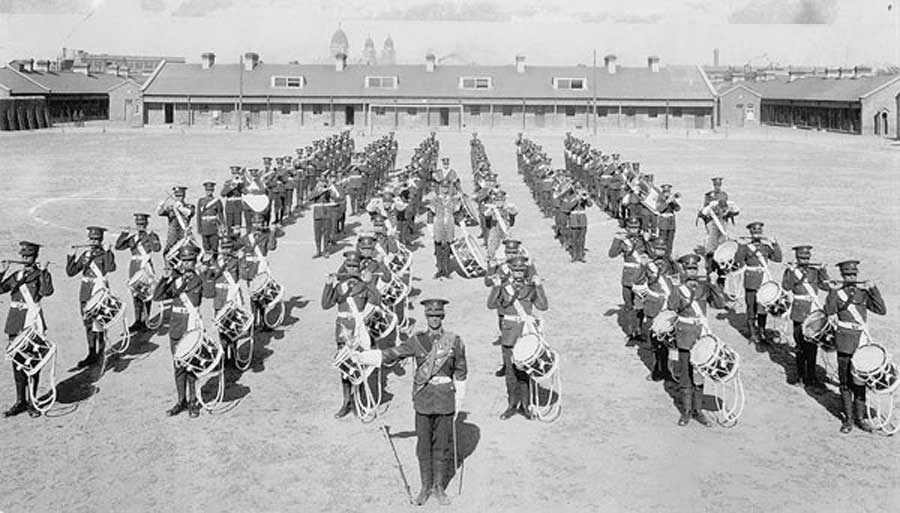 |
| The Band and Drums, 1st Bn The Queen's Royal Regiment, China 1934 (Click image to enlarge) |
At last the familiar sight of mountains of packing cases, lorries and baggage parties was a thing of the past. The 1st Battalion under command of Lt Col H C Ponsonby DSO., MC., left St George's Barracks, Malta at 8.30 a.m. on 8th October 1930 to march to the ship. They were accompanied by two bands, The Royal Malta Artillery and The Highland Light Infantry, and passed the incoming Battalion, The Worcestershire Regiment on their way in. The Upper and Lower Barraca Gardens were thick with people, both Maltese and British who had come to wave farewell. The two arms of the breakwater were lined on one side by the Royal Marines band of HMS Glorious and the other by the band of The Highland Light Infantry. As the strains of Auld Lang Syne faded away HMT Neuralia, an old coal burning ship, made for the open sea and the long journey to China. There was a certain amount of regret in leaving Malta. It had been a station that had everything - the Battalion in one place - wonderful facilities for sport, racing and fishing. It was a nice climate for the families, with friendly locals and the Royal Navy to work and play alongside. Now they were off half way round the world to an unknown country to many serving in the battalion.
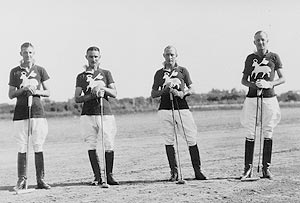 |
| Bn Polo Team 1933 Lt E J Foord, Lt B E L Burton, Lt M F S Sydenham-Clarke, Lt J F Metcalf |
The entertainment committee was soon at work. Boxing, Tug-of-War and obstacle races were organized. There was dancing since the band was on board, concerts and of course 'Housey Housey' There were children's sports and parties and the inevitable singsongs after dark. A certain amount of training could be carried out, such as weapon training. The officers had to study for promotion exams and war games ensued with a lot of argument! A daily sweepstake was run on the day's mileage and a prize collected from the Orderly Room. Troops were required for sentry duties, galley duties, messroom and general cleaning duties and of course spud bashing. All accommodation had to be clean and ready for inspection by the Captain at 1100 hours. A troopship was not all that comfortable for everyone on board. Married couples, including officers, were not allotted cabins necessarily together. Single sex cabins were common. The accommodation for the troops was very basic. The soldier had to use his allotted space, often well below the water line, for living, eating by day and for slinging hammocks by night. Fresh air was at a premium and was obtained from large canvas funnels which stretched from high above the upper deck where they caught the wind as the ship made way. It got hotter passing through the Suez Canal and by the time the Red Sea was reached it was calm and so hot that the ship had to turn around and steam into the wind to get a little air into the ship. Sleep was very difficult.
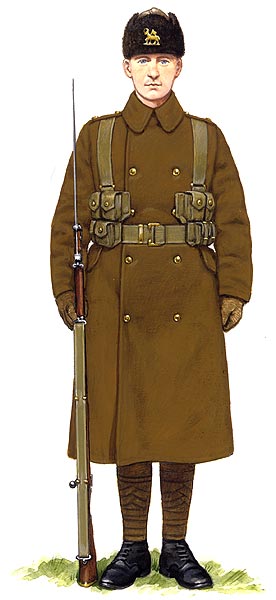 |
| Soldier dressed for Guard duty Tienstin, China |
After five days Bombay was reached. When the ship was berthed all troops went for a short route march and it was a joy to stretch one's legs again. Colombo was reached in the evening in pouring rain which obscured the pleasant view of green trees and sandy beaches. Then not a sight of land until the Malay Straits, missing out Singapore and encountering rough weather until the arrival at Hong Kong on November 5th just before sunset. Again a short route march, returning to the ship after dark. The lights on the Peak and the network of lights disappearing over the stern made a fine sight as the ship headed up the coast for Shanghai. Here rain again obscured the interesting view of the port and after leaving Shanghai early next day the last lap of the trip was started. The temperature slowly dropped and the deck sentries were withdrawn to warmer regions below. The last night at sea, November 10th, the temperature dropped thirty degrees in two hours and the problem was how to keep warm. Next day was Armistice Day and the Two Minutes Silence was a chilly affair standing on a frosty deck in a stiff icy breeze. When land was sighted at 1 p.m. it was even colder. The ship berthed at 5 a.m. at Ching-Wang-Tao, a small export town of the Kailan Mining Administration, with about eight white inhabitants. The unloading commenced next morning. The thought of an all night train journey in the cold was not appealing, however things turned out better than expected as the train was heated. D Company and the MG Platoon were sent to Peking for six months to take over the duty of guarding the British Legation there. The remaining soldiers were destined for Tientsin. Half the Battalion went up on 13th November and the other half and the families remained in the Neuralia until the 15th November before being sent forward. A break in the journey was made in each case at about 2 a.m., when hot tea, sandwiches and cigarettes were given to the passengers by the Mining Company. It reminded the older ones of a Great War station buffet!
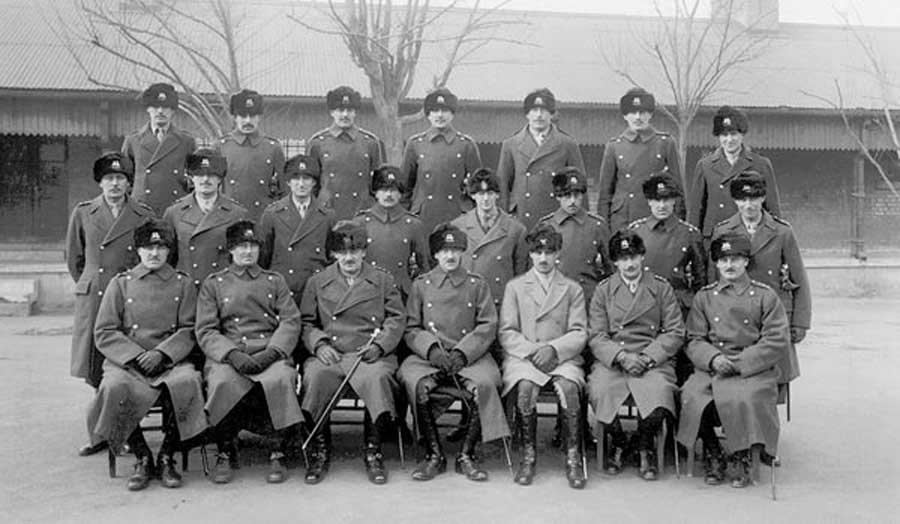 |
| 1st Bn The Queen's Royal Regiment, Tientsin, December 1931 (Click image to enlarge) |
The accommodation in Tientsin was very good. The barracks and offices were single storeyed with a cookhouse, dining hall and bath house, all being centrally heated. There was a good size gymnasium and drill square. The officers' quarters consisted of three small two storey buildings in which each bachelor had a bed sitting room; Their mess was in the British Concession about 200 yards away. Married officers had quite nice houses. Only one battalion was in Tientsin and Peking, but there was a small Brigade Headquarters at Tientsin. In Peking the officers' mess and the barracks were inside the British Legation Compound. They were all two-storey brick buildings and comfortable, with proper baths and running water - no tin tubs as in India. Each officer had a Chinese servant instead of a batman, and they were excellent. The officers' mess was run by a Chinese Head Boy with Chinese staff under the Mess Sergeant. The system was that the Head Boy obtained the staff and dealt with their wages. While they were employed they had to give so much each week to The Head Boy. If they were sacked and therefore unemployed the Head Boy had to keep them. This meant the Head Boy only employed the best. Rickshaws were used for transport although the odd bike was used by some. These two cities were the best stations in the world for our troops as living was so cheap and there were so many facilities. There were plenty of bars and White Russian girls to entertain both our men and those of all the other nations. Mrs Veasey, a Queen's wife, remembers her hairdresser was one of these girls driven to flee from Russia after the Revolution. One of our officers became fluent in Russian, which stood him in good stead while working with the Russians in Berlin many years later. It was an interesting time with Americans, French, Italian and Japanese troops in both places, as each nation had its own Concession with Chinese civil police. This was part of the treaty after the Boxer Rebellion.
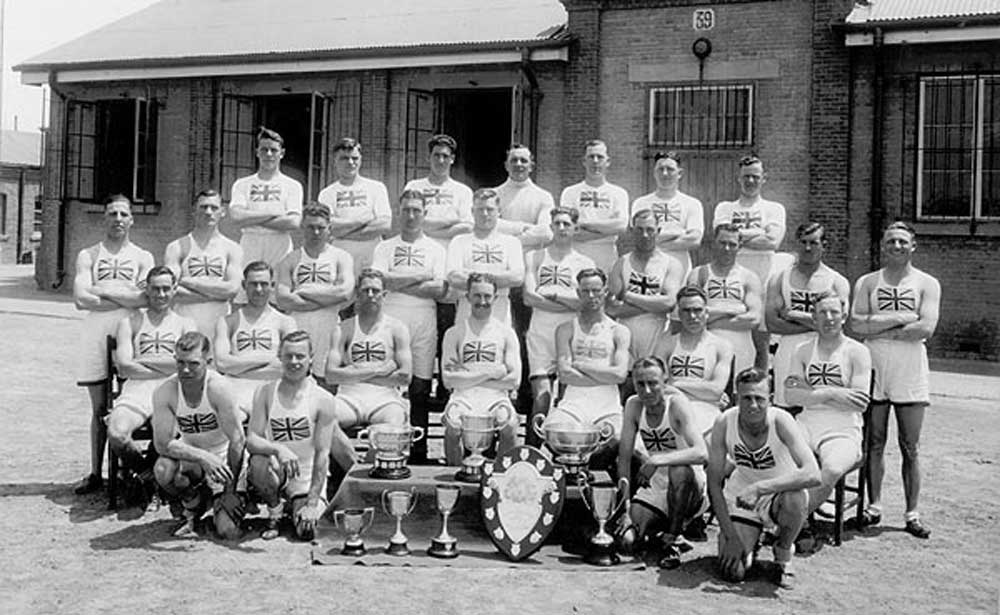 |
| Athletics Team, Tientsin 1934 (Click image to enlarge) |
Tientsin is located in a flat barren plain and in those days was quite the ugliest place imaginable! When the Battalion arrived the temperature registered about 15 degrees of frost by day and about 20 degrees at night. The cold was bearable except when accompanied by wind, then life became uncomfortable! North China is very cold and dry in the winter and very hot and dry in the summer. If the wind was off the Gobi Desert, sand storms were likely to take place. The sky would become yellow with sand and the light poor until the wind dropped, then the sand would fall like rain and covered everything. The dress in winter was greatcoats and leather jerkins with a fur cap with the cap badge at the centre. The dress for sentries was a fur cap, a long leather fur lined coat - a poshteen, long leather fur lined Gilgit boots and leather fur lined gloves. The tour of duty for a sentry was reduced to one hour. For contrast topees were always worn in the hot weather!
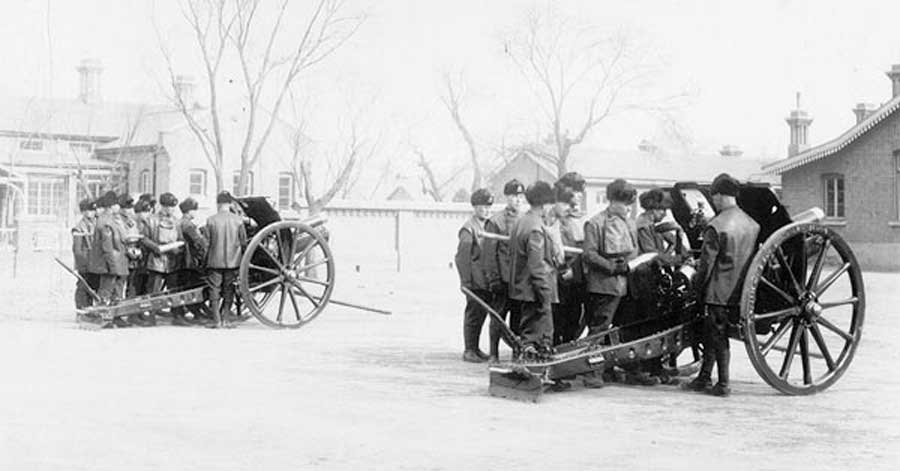 |
| Undergoing artillery training in the Legation (Click image to enlarge) |
Looking at the photographs of the Battalion at this time one is struck by their superb turnout. How the puttees could be put on so uniformly by all. A Church Parade took place every Sunday in Tientsin, the Band playing the battalion to church. The streets were lined with appreciative onlookers of all nationalities. In the winter it was not unknown for the band instruments to freeze up, it was so cold. While in China the Battalion was called upon to provide numerous Guards of Honour, accompanied by the Regimental Colour, as many senior officers and foreign dignatories visited the country. On Armistice Day each year a parade was held in both Peking and Tientsin. There were a number of ex-service men in Tientsin and they joined in and marched past the VIP taking the salute. However, there were not so many old warriors in Peking. It is interesting to note that the Battalion paraded with 20 rounds of small arms ammunition per man. The King's Birthday was marked each year with a parade with a feu de joie being fired, which needed endless practice. The Battalion trooped the Colour on St George's Day 1934 on Ming Yuan sports ground at 5.30 p.m. The ceremony was witnessed by a large international gathering, the salute being taken by H M Consul General at Tientsin. After the guards had departed the Band and Drums beat Retreat. The precision of the drill and the perfection of the turnout was noted by the foreign onlookers and commented on in the newspapers. The Band gave regular concerts in Tientsin and the Amateur Dramatic Society made use of their talent, and this was naturally much enjoyed by the musicians themselves. The Band played for their fellow soldiers in the barracks and at sing-songs whenever possible. A torchlight tattoo was held before the Battalion left for India. "Unique" spectacle in the recreation ground" was recorded in the Peking and Tientsin Times. It appears this was the first time such a performance had taken place in China. Great interest centred on a scene taken from the battle in September 1897 when the 1st Battalion were part of the Malakand Field Force and their camp was attacked by Mohmand tribesmen. In spite of the attack being a surprise it failed. The Signal Section, with turbans and blacked faces, were the "enemy" and much enjoyed the experience of brandishing swords and yelling their heads off whilst making all sorts of queer noises. The Band and Drums excelled themselves with the usual comic turns added. It was a wonderful show by the Battalion and RSM G Osborne MM was congratulated for directing such a spectacle.
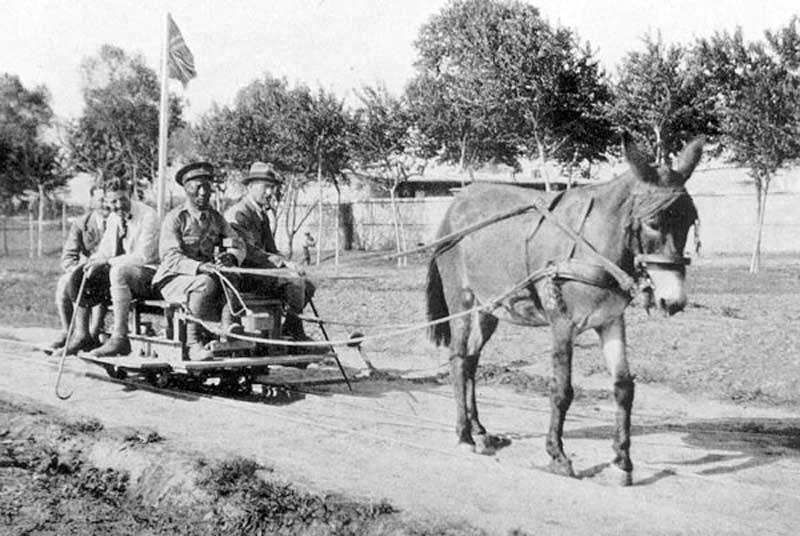 |
| Shanhaikuan 1931, British Trolley
with 1 pm 'engine' (Click image to enlarge) |
The training facilities at Tientsin were not good. There were no ranges, so shooting had to be undertaken while in the summer camps. The Peking detachment did have fine international ranges a few miles out of the city. These ranges lay side by side and it was highly dangerous to be using the 100 or 200 yard firing points as the Japanese advanced firing down their adjoining strip. The company and the rifle platoon at Peking inter•changed every six months. They had to assume gunner duties and became artillerymen as the Legation was guarded by two perfectly maintained field howitzers which stood guard with the stone lions at the entrance to the Legation. What is of interest to us now is a photograph, sent in by Henry Barker, of the team training with their Artillery sergeant all wearing respirators. The detachment was provided with 20 pack mules who were looked after by Chinese stable hands. During the hot weather the companies and the families went to the seaside at Shan Hai Kuan on the coast, adjacent to the small port where the Battalion had landed and where the Great Wall reaches the sea. The French, Italians and Japanese had summer camps there too, but the Americans were further down the coast. The Royal Navy and their families were also close, at Wei-hai-Wei, during the hottest part of the year. There was an inter-change of hospitality. The Navy excelled, by putting a visiting admiral on the shore from a sampan. The Battalion had its own 600 yard range and the area was suitable for field training. Platoons marched off into the hills to Erleng near the Great Wall, where Pte Rhodes remembers marching, wearing full gear, along the Wall! The men bivouacked out there for a week's training surrounded by lovely scenery, with a small lake fed by a mountain stream, which was bliss for bathers. During the latter part of their tour emphasis was directed to training for mountain warfare, to assist the Battalion on their posting to India. Shan Hai Kuan village and station were a few miles inland from the coast. Troops had to march to the camps, but the British had a very narrow - gauge line from the station on to the beach. This carried the baggage and the families, on a flat trolley being pulled by a mule.
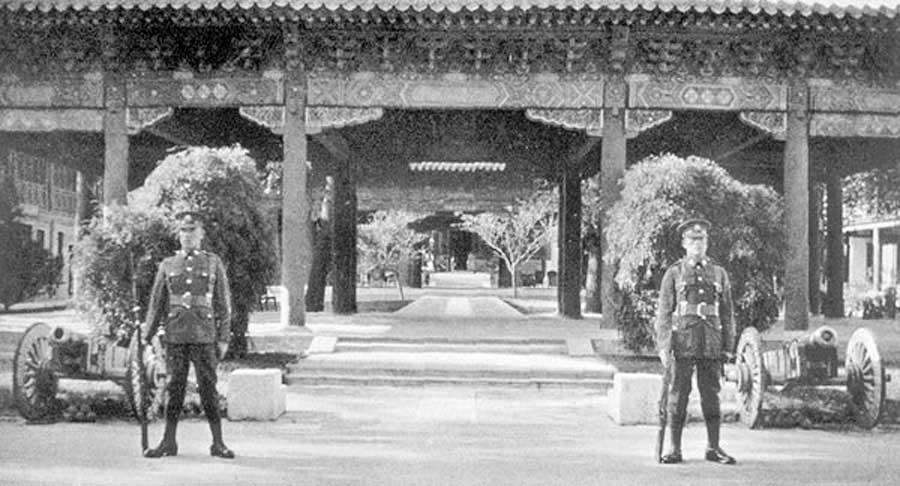 |
| British Legation Guard, Peking Summer 1931 (Click image to enlarge) |
While the Battalion were in camp here the Japanese occupied Manchuria and came right up to the camp boundary. They seized the Chinese parade ground and barracks and flew the new Manchurian flag. This was too much for one of our junior officers, and next morning a replacement flag was in position - a white flag with a red chamber-pot in the centre! Luckily the Chinese were the suspects and the Japanese wrath fell on them, saving an international incident. Whilst at this camp there was time for beach parties, riding Mongolian ponies inland, picnics of every description and boat trips. The Japanese did not interfere if such parties strayed into their new territory. The Sergeants had their Mess in a tin hut, where whist drives and dances were run. The Corporals Mess found they never could all get together because of the duties with the various detachments. At the annual rifle meeting the sergeants competed against the officers for the "Pink Column"; which they won. This silver trophy is now in the Museum at Clandon. It was great news for the Peking guard when the Battalion bought a "talking machine" with the help of the NAAFI. Films were shown six times a week and continuing the self help, the soldiers made a swimming bath for themselves, where standing room only was the order of the day. The rumours of the Sino-Japanese war came and went, but the Battalion was not involved or bothered by what was going on so near to them, although sometimes they had to delay going to their summer camp or had to leave early. In 1932 there was a change in command, Lt Col Ponsonby left in May after four years and was succeeded by Lt Col J D Boyd, DSO. China was a very lively station for all ranks, with parties taking place in all the messes. At Christmas a special tea party was held for the children of the Regiment.
The sport of kings was part of the life of the average Chinese citizen. They loved to gamble. It was not long before Regimental Race Meetings were organized and some of the members of the Battalion were on horse back while stationed in China. Lieutenant Monty Sydenham-Clarke* won a race in Tientsin and was presented with an inscribed watch. In 1941, in the Western Desert, he was reported missing. He was not heard of again until some weeks later when his body was found and identified by the watch presented to him by the Tientsin Race Club all those years ago! There was a game or sport just for everyone: Cricket, hockey, rugby, association football, ice hockey, ice yachting, skating and a battalion Polo team. A drag hunt was organized for the riders and there was tennis, especially on the hard courts in Peking, boxing within the Battalion and against the Americans and other nationalities whose troops were stationed there. Athletics were very much to the fore and international events took place. Our older readers will be interested in the fact that Corporal Sam Sharp seemed to win many of the races including breaking the tape in the 110 metres hurdles during the French International Sports in Tientsin. The ladies were not to be outdone and once a week fired on the miniature range and excelled themselves! With the cost of living in our favour most soldiers could afford to take part in the sport of their choice. But as one soldier remarked "the rate of exchange may have been in my favour but I was still broke on Saturday night".
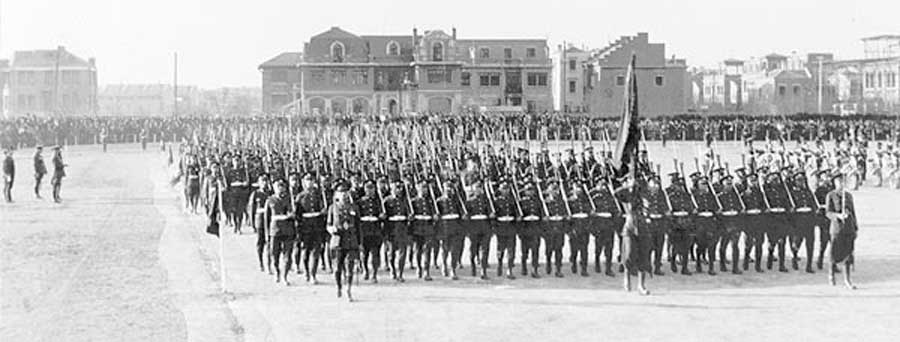
Trooping the Colour, April 2nd 1933. Captain A J Sullivan, 2/Lt R P Mangles, Lt J F Metcalf
The Journals of the early thirties make very little mention of the families, but we know China was an accompanied posting. The ladies were frequently entertained in the Sergeants' Mess, and the Corporals' Mess ran a ball in Peking. Life was very social with the facilities of the local clubs available and with the hospitality of the foreign military units. The Royal Navy, in particular, gave some wonderful parties. Any young daughter of the Regiment would have had plenty of men to escort her, although one has to remember in those days a chaperone was required. With labour being so cheap the young marrieds would have been able to leave their children with an amah, who would also have helped with the washing and mending. While thinking of servants the average family employed No 1 Boy, No 2 Boy and cook, who produced English type food, with a rickshaw boy and a groom for the ponies. Mrs Veasey, wife of Captain H G Veasey, discussed her life with the Battalion in China, with the writer. She was 37 when she boarded the troopship with her two girls and a governess. In those days it was common for officers to take these ladies abroad as the education was a bit inadequate. An officer was entitled to an indulgence passage for the governess who probably only earned a pittance. If she was attractive she probably was married before too long!
There was a school in Peking but not in Tientsin. The Regiment must have had an Army schoolmistress to teach the Battalion's children, but there is no mention of her in the Journal. On arrival in Tientsin the Veaseys lived in a hotel and then found a furnished home in Race Course Road. Tientsin was a good 'playground' with the presence of the Diplomatic Corps and the Americans, not to mention the other nationalities. The shops were good, with Whiteway and Laidlaw much to the fore. There was a German restaurant, with a band playing, for coffee in the morning and also for afternoon tea and delicious cakes were available. It was the same tale as in India, if you gave a dinner party you borrowed plate etc from next door and recognized your own when you went out! The system seemed to work. The families moved to Shan Hai Kuan with the Battalion and they had bungalows on the beach. Then the Japanese invaded Manchuria and started the Sino-Japanese troubles. Although they rode into the Japanese area and picnicked they were never molested. Foreigners were harassed and firing was heard in Tientsin and the tension could be felt. Tientsin had a hospital staffed by British nurses. Most people visited Peking to see the Summer Palace, but there was plenty to visit and sightsee. A bonus for the ladies were the Chinese dressmakers; Chinese silks and brocades were very beautiful and the shoemaker made the slippers to match, all for very little money. All good things have to come to an end. For four years China had been a wonderful experience, but it was time to get back to the real world and soldiering. Orders were now received to move to Quetta and on 2nd November 1934 the Battalion entrained at Tientsin station. Large crowds turned out to give them a magnificent send-off; the crowds of friends being so great as to make entrainment difficult. The voyage to India was uneventful and drafts were left at Hong Kong and Karachi to return to the UK. India was not home, but it was much nearer home than China!
Related
